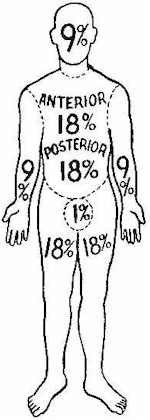|
Medical Education Division |
Operational Medicine 2001
Second United States Revision of The Emergency War Surgery NATO
Handbook
United States Department of Defense
Home · Military Medicine · Sick Call · Basic Exams · Medical Procedures · Lab and X-ray · The Pharmacy · The Library · Equipment · Patient Transport · Medical Force Protection · Operational Safety · Operational Settings · Special Operations · Humanitarian Missions · Instructions/Orders · Other Agencies · Video Gallery · Phone Consultation · Forms · Web Links · Acknowledgements · Help · Feedback
|
Emergency War Surgery NATO Handbook: Part I: Types of Wounds and Injuries: Chapter III: Burn Injury Magnitude of InjuryUnited States Department of Defense The severity of thermal injury is dependent upon the depth and extent of the burn. These two factors determine not only mortality and initial treatment requirements, but also morbidity, metabolic consequences of injury, character of healing, and the ultimate functional result. The extent of the body surface burned can be estimated by employing the "rule of nines." The distribution of surface area by anatomical part in the adult is illustrated in Figure 15, showing the percentage of total skin surface represented by each body part to be: head and neck, 9%; anterior trunk, 18%; posterior trunk, 18%, upper extremities, 9% each; lower extremities, 18% each; and genitalia and perineum, 1%. To estimate the extent of irregularly disposed burns one can make use of the fact that one surface of the casualty's hand represents approximately 1% of his total body surface. Patients with burns of more than 15% of the body surface typically require some resuscitative treatment and, in most situations, are best cared for in the hospital. Young soldiers tolerate thermal injury best, while older casualties (above 50) and the very young have greater mortality rates for a given extent of burn. The location of the burn influences not only prognosis but also the need for hospitalization. Small burns of the face, hands, feet, or perineum may require hospitalization, even if these limited areas are the only sites of burn injury.
Approved for public release; Distribution is unlimited. The listing of any non-Federal product in this CD is not an endorsement of the product itself, but simply an acknowledgement of the source. Operational Medicine 2001 Health Care in Military Settings
This web version is provided by The Brookside Associates Medical Education Division. It contains original contents from the official US Navy NAVMED P-5139, but has been reformatted for web access and includes advertising and links that were not present in the original version. This web version has not been approved by the Department of the Navy or the Department of Defense. The presence of any advertising on these pages does not constitute an endorsement of that product or service by either the US Department of Defense or the Brookside Associates. The Brookside Associates is a private organization, not affiliated with the United States Department of Defense. |
